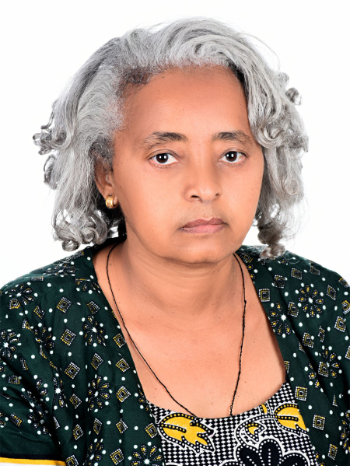Take Five: We must invest more in health and prevention of violence for adolescent girls in humanitarian settings
Date:

During crises, women’s and girls’ health and rights get neglected, because other perceive priorities (food, shelter, safety) comes first. In such circumstances, women and girls, especially adolescent girls, need strong advocates who will stand up for their health and rights, advocate for improved access to health care services, and who work tirelessly to change harmful social norms that hinder women’s and girls’ access to sexual and reproductive health services. One such advocate in Ethiopia is Dr. Aster Teshome, Founder and President, Centre for Adolescent Girls Health and a former expert on adolescent and reproductive health at the Ministry of Health of Ethiopia. UN Women talked to Dr. Aster on the challenges adolescent girls face accessing sexual and reproductive health services and the ways this access can be improved.
What are the main barriers that hinder adolescent girls’ access to sexual and reproductive health?
From my experience, the main barriers that hinder adolescent girls’ access to sexual and reproductive health are:
- Lack of education. If women are not educated, their only chance in life is to become a household wife. Marriage is the only option for the majority of women and girls.
- Poverty and limited resources: Lack of education leads to limited economic opportunities for women and girls.
- Teenage pregnancy: All the energy they could have invested in education, girls invest in getting pregnant, raising children and looking after the family.
- Child marriage: This is a big challenge for Ethiopia, as many women get marry before they turn 18.
As a result of all these, adolescent girls have limited awareness about their sexual and reproductive health and rights.
Tell us about their situation in humanitarian settings.
All know that barriers exist and hinder women’s and girls’ access to sexual and reproductive health (SRH) care services are exacerbated in humanitarian settings, worsening the already critical situation making it hard for women and girls to access their basic health care and rights for medicine, care, and respect.
Majority of investment in the country moves to the crisis, majority of resources go to mitigating crisis.
Women and girls are also usually the first responders to crisis. They are the ones who worry about food, water, and shelter. They are the ones who need to look after children. They play a central role in the survival and resilience of families and communities.
In addition to this, any crisis can be a contributing factor to gender-based violence because during crises access to health services could be limited and other priorities come first.
What are the solutions and what needs to be done to ensure women and girls continue exercising their health and rights for essential health care services?
It is a vicious cycle: if pregnant women or young mothers are not healthy, how we can expect neonate/ children to be healthy? We must invest more in improve health care services and prevention of violence; nutrition; education, awareness rising for adolescent girls, especially for girls in humanitarian settings.
We need to continue advocating for better resources, for continuation of health care services, and working with communities to raise awareness about health services.
With investments and programing in this area, do you see any change happening?
In humanitarian settings, women and girls, especially adolescents, need strong advocates who will stand up for their health and rights, advocate for improved access to health services, and who work tirelessly to change harmful social norms that hinder women’s and girls’ access to sexual and reproductive health care services.
Advocacy takes time. You do not see results immediately. Advocacy should continue and promote multi-sectoral collaboration. Ministry of Health, Ministry of Education, Ministry of Women and Social Affairs – they need to strengthen work hand in hand together. We need cross-sectoral collaboration; we cannot do it alone on our own.
The advocacy workshop as part of UN Women’s POWER porgramme is a great platform to bring together all parties responsible for ensuring access to sexual and reproductive health services for women and girls.
Is there anything that I have not asked, but you would like to add?
I would like to emphasize the importance of investing in adolescent girls’ health, adolescent nutrition and adolescent education. We need to create opportunities for vulnerable girls to become literate and develop basic skills, critical health care knowledge, obtain access to social services including sexual and reproductive health and HIV prevention, prevention of gender-based violence, gain education and fulfill their potential. I would like to urge to make these investments especially during crisis.
The POWER programme is implemented in Uganda and Ethiopia – countries that host most of the refugees in the Horn of Africa. It focuses on three outcomes specifically in refugee camps and host communities: ensuring there are frameworks that take into consideration women’s and girls’ access to SRMNCAH services in humanitarian settings; improved gender norms and practices; and empowered women and girls to exercise their rights to services. Education, awareness raising and community work in refugee camps and host communities are critical elements of the programme. The programme is supported by the Austrian Development Agency.